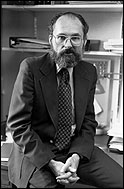Don Bates: A scholar and a leader
Don Bates: A scholar and a leader McGill University
User Tools (skip):
Don Bates: A scholar and leader
 Professor Don Bates
Professor Don BatesPHOTO: Harold Rosenberg / McGill Archives |
|
Don G. Bates, Cotton-Hannah Professor of the History of Medicine, died at his home in Montreal on Sunday, August 5.
In 1966, Don came to McGill as associate professor of the history of medicine and acting Osler librarian. He received his PhD from Johns Hopkins in 1975 and one year later became the Thomas F. Cotton Professor of the History of Medicine at McGill.
During his tenure as Osler librarian, Don oversaw a major re-orientation of the library's mission and practices. He initiated an aggressive and systematic acquisitions program and secured new sources of funding. He generated great controversy when he merged Osler's original library into the general collection.
In 1971, Don stepped down as Osler librarian but the library remained close to his heart. He worked closely with his successors on many projects and served as chair of the standing committee of the library's board of curators until illness forced him to step down.
Don's energies during the 1970s were directed principally towards building the department in the Faculty of Medicine, that would become Social Studies of Medicine. He decided early on that it was necessary to move beyond the discipline of history. The expansion of his department began modestly in 1973 with the appointment of a part-time sociologist. There are currently six full-time positions in the department, representing the disciplines of medical history, medical sociology, and medical anthropology.
In 1982, Don stepped down as department chair but continued to served as a trusted advisor of everyone who followed him in that position.
During the years of harsh budgetary cuts at McGill in the 1990s, the existence of a tiny department like SSOM seemed in jeopardy. Don made several trips to Toronto to hold talks with the directors of Associated Medical Services, which financed chairs in the history of medicine in Ontario. He convinced them to support the history of medicine at McGill and the result was a $500,000 donation to top up the endowment of the Cotton Chair, which subsequently became the Cotton/Hannah Chair of the History of Medicine.
Don's scholarly activity was considerable. His early work centred on the intellectual history of medical thought, notably the medical ideas of Thomas Sydenham. But Don eventually lost interest in this subject and in the kind of history that he had been trained to practice. Part of this had to do with an activist nature that pushed him toward other activities.
Don became a prominent peace activist. He was the Canadian representative on International Physicians for the Prevention of Nuclear War when that organization won the Nobel Peace Prize in 1985. Locally, he was founder and chair of the McGill Study Group for Peace and Disarmament.
Historical research again became Don's overriding passion in the late 1980s. He found the large theme that he needed in the debates about the nature of science that had broken out in historical, philosophical and sociological circles. He became passionately interested in studying Harvey's discovery of the circulation of the blood because he saw it as critical for understanding the nature of modern science. Don spent over a decade doing preliminary work for this ambitious study. Among subjects he immersed himself in was a comparison of the western scholarly tradition with comparable traditions in China and India. His most significant intellectual achievement during these years was the book he edited on this subject, Knowledge and the Scholarly Medical Traditions (1995).
Don viewed this book, as well as the meticulously-researched and carefully-argued articles that he published during the past decade, as necessary background for the book that he wished to write. By the fall of 2000, all the pieces were in place and an outline had been prepared. Tragically, he learned in October that he was ill with ALS.
When it became clear that he would not live long enough to write this book, he set out to produce a long summary essay outlining the ideas and arguments that he would have liked to develop more fully. Despite rapidly deteriorating physical powers, he managed to complete this essay last spring. His colleagues in the department have undertaken to organize an international scholarly meeting to examine and develop the themes of this essay.
Don was a gifted teacher and especially good with medical students, who responded to both his warmth and his understanding of their experience. He was a wonderful colleague, kind, unselfish and giving of his time. His integrity was unflinching and he fought tirelessly for important matters of principle. He will be deeply missed by colleagues and friends.
Department of Social Studies of Medicine

